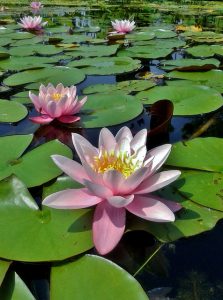 Do you have a pond that your fish will appreciate? Several factors influence whether a pond is habitable by fish, so before your stock your new pond or choose a few new finned friends at your water gardening store, take a few minutes to assess your fish’s dwelling space.
Do you have a pond that your fish will appreciate? Several factors influence whether a pond is habitable by fish, so before your stock your new pond or choose a few new finned friends at your water gardening store, take a few minutes to assess your fish’s dwelling space.
Size Matters
It all starts with the size of your pond. You need to make sure that it is large enough to support fish and their growth. Pond fish generally need 10 gallons of water for every inch of their length, and you have to be ready for them to grow larger, so be careful not to overstock, no matter how tempting this may be! Some pond experts go so far as to recommend only ½ inch of fish per 10 gallons of water as a maximum stocking density.
On occasion, you may encounter ponds crowded with 2 or even 3 inches of fish per 10 gallons of water and the fish seem to be fine. However, the density and ecological strain of this loading turn these ponds into fragile systems. The pH tends to sag, the fish tend to grow more slowly, and disease can become a common occurrence.
You won’t be able to salvage sick fish in a pond that’s overcrowded. Eventually, Mother Nature will pick off your favorite fish to achieve her ideal stocking density based on the system the fish are in, and then the remainder will recover as if by magical intervention. So reduce the number of fish if your pond is overstocked before Mother Nature handles this crucial step for you.
Good Morning, Sunshine
Ponds that have some sunlight are also beneficial to fish due to the valuable vitamins that are produced. Sunlight also helps the plants in your pond grow, thereby reducing nitrates in the water. Unfortunately, you can’t just up and move your pond so if you have a shaded pond, simply add shade-loving plants to help balance the water.
Two Feet
When it comes to pond depth, koi aren’t very picky. Just be sure that the pond is deep enough (generally about 2 to 2 ½ feet) to give the fish a chance to get out of the way of predators. This depth also provides ample space for over-wintering fish in northern climes.
A Balancing Act
The quality of your pond water is critical to fish health and you want to make sure your pond is balanced. The proper mix of fish, plants, filtration, circulation, and rocks and gravel all provide an important role in your pond’s ecosystem. Work with Mother Nature, not against her, and you’ll find you spend more time enjoying your pond and less time maintaining it.
